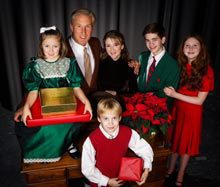 Shakespeare Rep’s Debra Charlton talks about the Scottish curse, those crazy Oxfordians, the Bard on film, and her upcoming production of Macbeth at USCB.
Shakespeare Rep’s Debra Charlton talks about the Scottish curse, those crazy Oxfordians, the Bard on film, and her upcoming production of Macbeth at USCB.
By Margaret Evans, Editor
Debra Charlton knows her Shakespeare. The founding artistic director of Beaufort’s newest theatre company, Shakespeare Rep, she holds a doctorate from the University of Texas at Austin, where she pursued specialties in Shakespearean performance, production and pedagogy. She completed additional graduate work at the Centre for Medieval and Renaissance Studies in Oxford, England.
Debra has directed an extensive list of productions, including King Lear, The Taming of the Shrew, A Midsummer Night’s Dream, Romeo and Juliet and The Winter’s Tale. In addition, she has played many leading roles from the classical repertoire. In 2011, her production of Romeo and Juliet was selected to perform in the UK on the Dell Stage of the Royal Shakespeare Company.
This April, in celebration of Shakespeare’s 450th birthday, Debra will direct a mostly local cast in Macbeth, at the USCB Center for the Arts, in partnership with the University.
Q) You’ve been studying, teaching, directing, performing and writing about Shakespeare your entire adult life. Do you ever get bored with the Bard?
A) Working with Shakespeare is like peeling an onion. Layer upon layer of new discovery. Always fresh and exciting.
Q) William Shakespeare was living 450 years ago. Why do you think we’re still reading and performing his work in the 21st Century?
A) His ability to combine consummate artistic craft with authentic emotion makes his work speak to us perhaps more clearly than any other English playwright. He was a master craftsman but also a deeply feeling person and that duality is reflected in his plays.
Q) Though you have many Shakespeare productions under your belt, both as director and performer, this is your first production in Beaufort. Why debut with Macbeth?
A) It is one of my favorites and maybe his most accessible tragedy. The story, about two people driven by ambition to commit murder – and the subsequent guilt they experience – could be applicable to any modern day crime saga.
Q) Some people think Shakespeare is intimidating . . . difficult to understand. Will Shakespeare Rep’s production of Macbeth be accessible to the average theatre-goer?
A) My primary goal is to ensure that Macbeth is accessible to all audiences, regardless of their level of comfort or previous experience with WS. Macbeth is one of Shakespeare’s shortest plays, and I have employed additional editing to make sure the story really moves. Our version will run just over 2 hours with intermission. I want to tell the story with great clarity – this means helping the actors to understand every word of the text and to speak with precision and specificity so that they can convey that meaning to the audience.
Q) You’re currently writing a book about Lady Macbeth in Performance. Do you think Lady M is a misunderstood character?
A) Oh yes. I don’t know any actor who has played the role who agrees with the “fiendish queen” label. She has tremendous vulnerability that alternates with moments of high resolve. For our production, we have a sensational young actress, Erin Dailey, who beautifully transitions between those moments of fragility and strength. She will be riveting to watch because she is creating a fully dimensional, even sympathetic character. Enormously talented – Beaufort is lucky to have her in our artistic community.
Q) How seriously do thespians take the Scottish Curse these days . . . the old superstition that it’s not safe to utter the name of ‘Macbeth’ within a theatre?
A) Pretty seriously. I was a bit blase initially until I cut my hand assembling scripts and then one of our actors was involved in an accident. All before first table read.
Q) You are the author of Holistic Shakespeare: An Experiential Learning Approach. Could you explain, in a nutshell, what you mean by “Holistic Shakespeare”?
A) Holistic learning seeks to engage students’ cognitive, emotional, spiritual and ethical intelligences through exercises that engage both sides of the brain and that value diverse learning styles.
Q) For those of us who love to watch Shakespeare on film, which adaptations top your list of favorites?
A) My top favorites are probably Branagh’s Much Ado About Nothing and Trevor Nunn’s Macbeth. Another less conventional favorite is Macbeth on the Estate – a modernized version that retains Shakespeare’s original language, but sets the action in a gritty British housing estate (project). It is amazing how well the language works in that setting. And the minor characters are played by real life residents of the estate, which is also an interesting twist.
Q) What do you think of the “Oxfordians” – those scholars who believe the plays of Shakespeare were actually written by Edward DeVere, 17th Earl of Oxford? Crazy . . . misguided . . . or onto something?
A) We all love a good conspiracy theory, don’t we? I am, nevertheless, 100% convinced, based on both the literary and biographical evidence, that the plays were written by a man named William Shakespeare, who was born in Stratford-upon-Avon in 1564. And whose 450th birthday coincides with opening night of Macbeth here in Beaufort.
Q) I recently took one of those Buzz Feed quizzes that are all over Facebook. This one asked, “Which Shakespeare Character Are You?” Somewhat disturbingly, I got Hamlet. If you’ve taken the quiz, who did you get? If not, who do you think you’d get?
A) I actually started one, but got distracted midway through. Hmmm . . . Maybe Beatrice from ‘Much Ado’?
Macbeth will run from April 23 – 26 at the USCB Center for the Arts. Tickets are on sale at the Box Office. Call 521-4145. For more information about Shakespeare Rep, visit www.shakespearerep.co/









